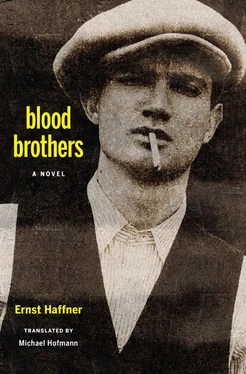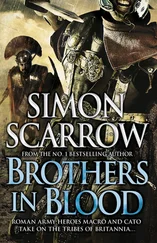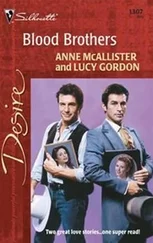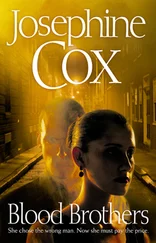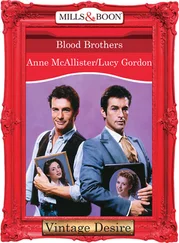A sergeant walks Ludwig to the prison office. He is to wait in an area separated from the office by a chest-high partition. “Have you got any money or valuables on you?” asks the official. Ludwig hands him the mark he was given by the hoodlum. Then he is taken away to prison. In front of him the endless corridor, left and right indistinguishable, cell by cell. Brown iron-clad door by brown iron-clad door. Only the numbers of the doors, which are the same as the numbers of the inmates, change. In the reception area, Ludwig is called upon to empty his pockets. Everything is taken off him. Then he is brought to a cell, and he’s on his own. A rock-hard rumpled field bed, with blue-and-white sheets and two woollen blankets. A stool, a wall-mounted shelf for his tin dish, a drinking cup and a water jug. In the corner a stinking toilet. There’s no space for a table.
The hobnails of the guards clank along the stone-flagged corridors. An eye looks through a peephole in the door, watches the inmates on the toilet or dreaming of freedom and girls … A jangle of metal against Ludwig’s cell door. The insertion of a big key into the lock hits him like an electric shock. “Come on.” He is handed over to a civilian official, who is to take him to get processed.
Up stairs and down, round corners and into obscure nooks of the huge labyrinthine building. A large bright room on the ground floor. Trams whizz past outside. “Go in there.” Ludwig is shown into a cage of loose wire, next to a whimpering little girl. Almost a child. Wonder what she’s done? Whatever it was, she is measured, fingerprinted, photographed from the front and both sides, as though she is a dangerous criminal. Ludwig’s turn next. He has to wash his hands. “Otherwise your sweat might blur the prints,” the official explains. He takes Ludwig’s right hand, and gently presses the fingertips on a plate, which has previously been impregnated with printer’s ink. Then he takes Ludwig’s fingers one at a time, and presses each one in a space on the prepared personnel-data sheet. And then the same thing with the left hand. The prints of all ten fingers on both hands are to be kept for perpetuity. Then the photograph. A white draped room. Ludwig has to sit on a square stage. Rods at his back make him sit up straight, at both sides the delinquent model is kept in an upright posture. A flash of light. One profile is in the bag. The official pulls a lever. Ludwig, not having moved, is now full-face. The procedure a second time, with cap, then Ludwig is taken back to his cell.
WILLI KLUDAS IS WOKENby a terrible pressure. A heavy object is lying on top of him, crushing the breath out of him. Broad awake, he opens his eyes. He can see nothing, nothing at all. Below him something is going rat-ta-ta-TA … rat-ta-ta-TA. It takes Willi a while to get his bearings. Yes, he ran away, climbed into a railway wagon, and lay down among the wood wool. And it’s a dislodged bale of wood wool that’s crushing him. It’s too big for him to lift. He twists and wrestles with difficulty until he’s lying on his stomach, and slowly wriggles clear of the bale. When he lifts the heavy tarpaulin at the back of the wagon, he finally sees that it’s nighttime. The train is idling along.
In the brake hut of the wagon behind his own, Willi suddenly sees a little spark moving around and flaring. A smoking railwayman? Or a stowaway, like himself? Hurriedly, he re-secures the tarpaulin and squeezes down among the bales again. It’s warmer there as well. He’s still got a cigarette and a couple of squashed slices of bread. But nothing to drink. He smokes the cigarette first, careful not to get too near the wood wool. Where is the train going? The passing landscape gives no clues. And how long has he been traveling for? The locomotive whistles, then twice more, and the brakes start to squeal. No approach. Willi twists his way up, in the hope of maybe spotting the name of a station. The train has stopped in the middle of nowhere.
Cautiously Willi peeks through a finger-wide crack in the direction of the brake hut. The door opens, and a hatless head can be seen peering in all directions. There is no sign of any railway personnel. Now the man clambers down from the hut, stops at the bottom to look about him, and then slaps his arms round his ribs to warm up. Willi’s eyes drill into the darkness to try and make out the figure. Slowly, slowly, he can make out a bearded face, a jacket, and a pair of tracksuit bottoms with puttees. No sign of a railwayman’s uniform. Should he call out to the fellow? Perhaps he can tell him where they are. On an impulse, Willi pushes up the tarpaulin and softly calls out: “ Psst , mate, over here!” The form jumps, makes to run off. Willi calls out a second time, and leans out. The tension leaves the man’s body, and he comes closer. Willi pulls up the tarpaulin invitingly, and with a single bound the stranger is up with him. When the tarpaulin has been reattached, the bearded man pulls out a torch and shines it in Willi’s face. What he sees seems to calm him down. “Journeyman?” he asks. “No,” replies Willi, “I’m on my way to Berlin.” The man laughs. “Berlin, eh? By the time it gets light, we’ll be in Cologne!”
The news comes as a shock to Willi. Cologne? What would he do in Cologne? He doesn’t know a soul there. That means he’s been going in the wrong direction all this time. Would it be best to jump off now, while the train is stopped? No, there’s no point. “Does it have to be Berlin?” asks the stranger. “Yes, I know someone there who’ll help me out,” replies Willi. “There is a way of getting to Berlin quickly and for no money,” says the stranger, “but it’s dangerous. I know some who’ve fallen on the tracks and been turned into cat food.” Willi asks what it is. Says he’s ready for everything. Here in the Rhineland, the only alternatives are starving to death and turning himself in to the police. In Berlin he knows the ropes. Things will be better. But he needs to get there quickly. It could take a week or more on a goods train. The stranger shines his torch in Willi’s face again. “Don’t go anywhere, I’ll just get my pack out of the brakeman’s hut.”
No sooner is he back than the locomotive whistles again. The train moves off. Willi and the stranger join forces to heave the bales out of the way, to give themselves more space. The stranger introduces himself to Willi. In spite of his beard, he’s only thirty, is Franz, tramp from conviction, wanting to see Cologne again, where he hails from. Could be that Franz will be in Berlin in another week. Who can know? Willi volunteers that he’s fled from borstal. Franz is busy doing something in the dark. The next time the torch flashes on briefly, Willi sees a bundle of newly rolled cigarettes in Franz’s cap, rolled in the pitch black. Christ, the fellow’s skilled. And then, when the two of them are smoking, Franz comes out with his plan of getting Willi to Berlin in quick time. There’s a little pause for effect, then he says curtly: “The express.” “Get away!” says Willi in his disappointment. “No, I’m serious, the express!” Franz insists. “But what about the inspector, for Christ’s sake!” objects Willi. “You don’t get no inspectors there. They’re all up in the train.” Franz laughs. “You’re underneath the train.” Willi freezes. Under the express, at sixty mph? Never! Where is “there,” anyway? Under the carriages? Where do you hang on to when it’s racing along?
Franz takes his time. Long before departure, when the train is still in a siding, the stowaway has to climb under the train and hunker over an axle. That’s where he has to hang, a foot or two above the ground. If he drops off, he’s dead. But there’s a chance, too, that a fist-sized chunk of ballast could bounce up and kill him. Or that his arms and legs seize up with cold or lack of movement, and can’t hold him up on the axle anymore … The prospects as Franz describes them aren’t exactly rosy. He admits that he only takes this route when he’s really up against it. His most horrible experience under an express was going from Warsaw to Berlin one time. From Warsaw to Berlin under the express! “For cowards I expect it’s easier to take a goods train,” Franz concludes. “I’ll take the chance,” Willi determines. It doesn’t sound especially heroic, but it’s a decision, and Willi is determined to follow through. Franz offers to put Willi under the right train in Cologne — a city Willi doesn’t know — and also offers to help equip him for the ride. Franz doesn’t pursue the conversation, and Willi’s thoughts are too preoccupied with the risk he’s staring at. The train goes on with its monotonous rat-ta-ta-TA … rat-ta-ta-TA … rat-ta-ta-TA …
Читать дальше
